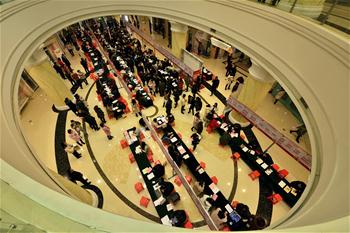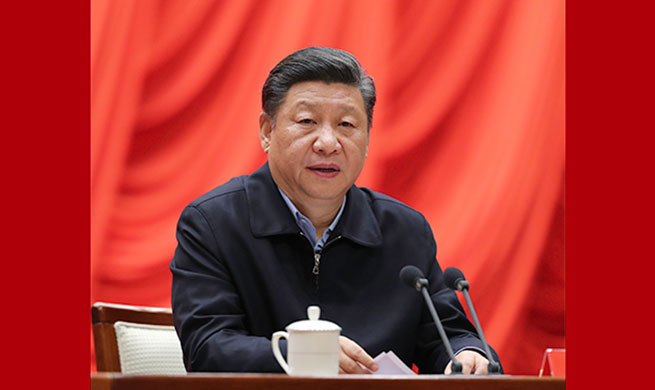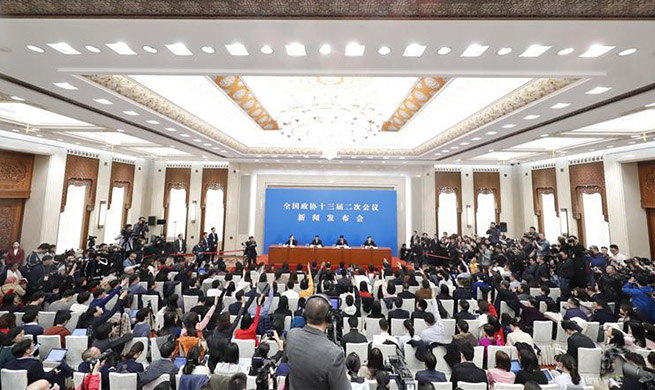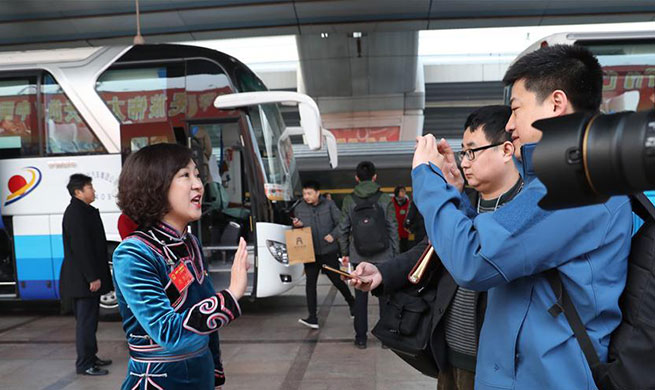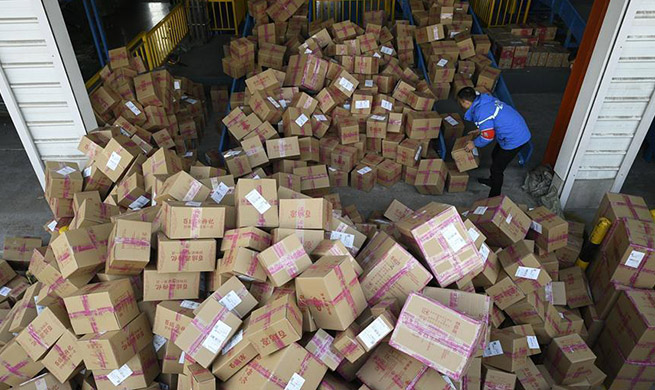ROME, March 2 (Xinhua) -- After a positive 2018 overall, the Italian fashion industry would risk a slowdown in 2019, and a good performance on emerging markets such as China could be crucial, according to experts.
The sector last year reached 66.6 billion euros (75.7 billion U.S. dollars) in turnover, growing by 2.8 percent on an annual basis, according to estimates by Italy's Camera Nazionale della Moda (National Fashion Chamber).
Exports amounted to some 39 billion euros in the period January-September 2018.
This marked a return to pre-crisis levels registered at the beginning of 2008, although confirming a gap of at least 3.5 billion euros in terms of production value, and some 4,000 less companies compared to 10 years ago, according to a 2018 analysis by economic think-tank Prometeia.
"The current global uncertainty is a problem for our industry, which relies on exports up to 80 percent of its production," Fashion Chamber President Carlo Capasa stressed recently.
Among the risking factors, Capasa mentioned the Brexit process, global trade tensions, and political instability affecting some European Union (EU) countries, such as Italy and France.
"We can still talk of positive growth, but with an expected slowdown," Capasa added.
Experts with Italian economic think-tank Prometeia agreed with this forecast. "This is a period of great uncertainty at global level, and the greatest risks come from the tensions on global trade and the slowdown of the global automotive sector," senior analyst Patrizia Di Cicco told Xinhua in an interview.
She explained these two factors were affecting the growth of global gross domestic product (GDP) and they would weigh, transversely, on specific productive sectors, fashion included.
Furthermore, Di Cicco added, the latest economic indicators on global trade were negative.
"In this context -- and taking into consideration the fact that China's economy is also slowing down -- we cannot rule out the Italian fashion system will face a downward cycle," the economist said.
If confirmed, this forecast would not be negligible for the eurozone's third largest economy. In fact, Italy has long been one of the fashion leading countries at global level, and its industry was one of the largest in Europe, together with that of France.
The industry counted on some 82,000 firms in 2017 considering the whole production chain, according to a study published by CRIBIS Industry Monitor and economic think-tank Nomisma in December.
It was the country's second largest manufacturing sector after metallurgic, employing over 500,000 people, 0.3 percent more than that of 2016.
Textile kept playing a strong role in the production chain, the CRIBIS-Nomisma report also stated, accounting for 19 percent of all companies in the sector, some 26.7 percent of its production value, 27 percent of turnover, and at least 20 percent of exports.
The industry's overall turnover in 2017 was 70.4 billion euros, representing 1.3 percent of the Italian GDP.
"The sector kept performing positively in 2018, showing a growth rate much higher than that of the overall manufacturing," the Prometeia analyst explained.
"Yet, it showed a lesser growth in the second half of the year, and the first economic signals in 2019 suggest that a further deterioration is possible," she added.
Foreign markets have been key for the good performance of the "Made in Italy" fashion in the last a few years, and would be even more so in the months to come.
A report by Italian investment bank Mediobanca in February showed, for example, that sales abroad made 78.3 percent of all sales outside the domestic market in 2017.
This was seen as a relevant result, although less good than that of France (87.7 percent), Germany (83.6 percent) and Spain (82.3 percent).
"Exports have been crucial, and especially those to non-European markets; and they will remain a driving force in 2019, also considering the weak domestic consumption trends," Di Cicco said.
"Net of a further international worsening of the global situation, the game will undoubtedly be played in emerging markets, and this will require Italian firms to make further efforts compared to a phase of positive growth," she explained.
More specifically, the expert suggested many Italian fashion companies should change their business model, and adjust to new consumers.
In order to thrive in a changing international context, according to Di Cicco, they would have to go much more digital, and to be able to intercept new categories of consumers.
"Consumers in emerging markets are different from those in mature markets, and so are the ways companies have to take to engage with them," the analyst said.
"Italian companies will have to work harder to intercept this new audience in emerging markets, which is much more digital than before."
One such market will be China, which was expected to overtake the United States as the world's largest fashion market in 2019, according to the latest "The State of Fashion" report by McKinsey & Company and the Business of Fashion (BoF).
"Many elements lead to confirm this forecast, and especially the presence of a Chinese wealthy class that keeps expanding," the Prometeia analyst agreed.
"How Italian companies will perform on the Chinese market will be crucial in order to counterbalance the possible slowdown," she stressed.
Most of all, this would need Italian fashion businesses to provide themselves with more human resources and professionals capable to "analyze and understand the great amount of information the digital world allow us to gather, and then make the most of it." (1 euro = 1.14 U.S. dollars)



